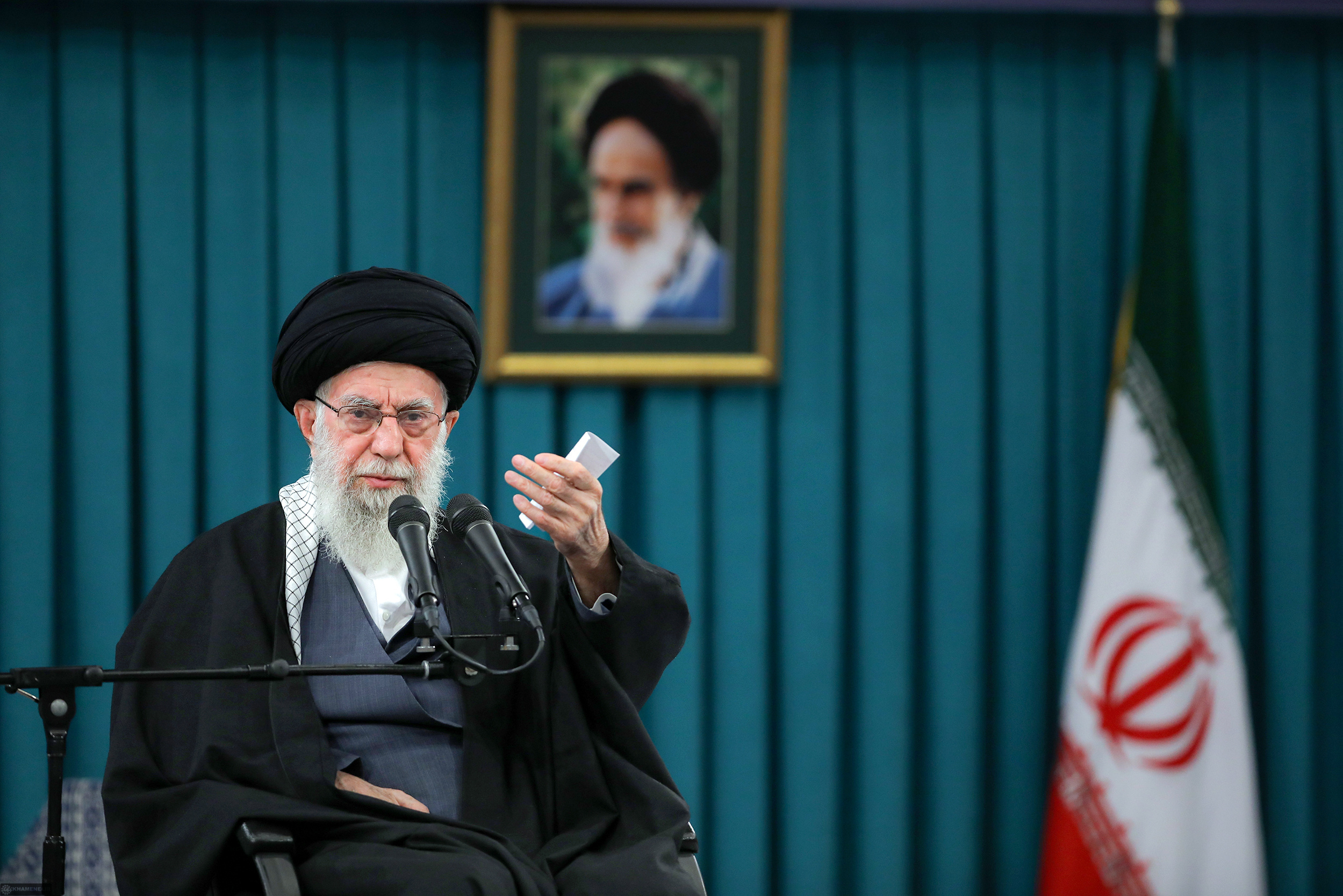AhlulBayt News Agency (ABNA): In a meeting with approximately 3,000 Iranian university students and representatives from political, social, cultural, and academic student associations, the Leader of the Islamic Revolution stated that the country and the government’s main goal is to build a brighter future.
During the meeting that was held in the Imam Khomeini (ra) Hussainiyah on April 7, 2024, the Leader called on students and student associations to provide innovative solutions to truly achieve this fundamental objective and advance the country without material or spiritual setbacks in future. He underlined the fact that the three primary functions of universities include the education of scholars, the production of science, and giving direction to these two areas.
Imam Khamenei described the student environment as being joyful, dynamic, stimulating, challenging, and full of enthusiasm. He emphasized the importance of examining the issues raised by the student association representatives during the meeting, and he also stressed that proposals should not only be analytical and well considered, but also realistic, well thought out, and contribute to solving problems.
In response to a speech delivered by one of the representatives of a student association regarding a change in the Leader’s perspective on "justice" over time, Imam Khamenei stated, “What has changed is that my insistence on justice has increased.”
He described this year's month of Ramadan as being a good month in terms of the emergence of spiritual aspects in society, including the prevalence of sessions for reciting the Holy Quran. While encouraging students to maintain the piety and purity they have gained during this month, he emphasized the importance of avoiding sinful behavior since this is the key to maintaining these achievements.
Elsewhere in his speech, the Leader of the Islamic Revolution stated that knowledge is the main pillar of universities. While highlighting the three main duties of universities, he stated, “Universities worldwide are experiencing problems with the third duty, which involves directing the education of scholars and the production of science. Because of this, their products become tools in the hands of the Arrogant and Zionist Powers.”
Emphasizing the necessity of paying attention to these three important tasks by all elements of the university, including managers, professors, students, and textbooks, he attributed an important part of Iran's global credibility to the country's progress in science and technology. “We must enrich the country scientifically by maintaining this credibility, and of course, the Arrogant Powers do not want Iran to have this power and credibility,” he explained.
Imam Khamenei added that the country and the government’s main goal is to achieve “a brighter future than the present,” while emphasizing that in order to attain this important goal, specific ideals must be ascertained.
The Leader of the Islamic Revolution considered the recognition of the country and the government’s current situation as a key initial step towards achieving the ideals of a better tomorrow. He noted that some individuals are unaware of the fact that the current Revolutionary system was established after enduring challenging and complex battles against the oppressive regime of the past.
In his clarification of the realities of the Pahlavi regime, Imam Khamenei said, “During that era, a family involved in all kinds of corruption ruled over the people in Iran, imposing absolute tyranny in the governance of society. Unlike today, the people lacked participation and involvement in the country’s affairs.”
Imam Khamenei viewed the identity of Iran during the Pahlavi era as being influenced by foreign political, social, economic, and cultural spheres. He described the situation that Iran was in during that time as shameful, while explaining that, “The battle against that bitter reality began in the early 1940s with the participation of individuals possessing diverse ideologies. The peak of this was the oil nationalization movement, which was defeated by the American-British coup that took place on August 19 [1953] with the involvement of rogues and thugs.”
He added that, “Academically, although there were skilled and competent professors in the universities during the Pahlavi era, reliable scientific, industrial and technological products were not being produced in universities.”
The Leader characterized the context of the Revolution as both “Islamic” and “Republic”. He summarized the ideals of the Islamic Republic into two general objectives: ‘Administering the country in an Islamic manner’ and ‘providing a model to people worldwide on how to properly administer a country.’”
In his explanation of the administration of the country according to Islamic principles, Imam Khamenei emphasized the importance of maintaining a continual progress in both material and spiritual spheres, without regressing.
He considered the second ideal of the Islamic Republic, that is, the presentation of a model of governance to the world, as a sympathetic and benevolent act towards individuals around the world. "This ideal has been partially achieved in some dimensions, and many of the events that excite you young people and make you proud on a regional and global level are related to your country, society, and Revolution," he remarked.
In his concluding statements, the Leader of the Islamic Revolution emphasized the high expectations placed on associations and offered his recommendations to them. Referring to efforts in universities to convince Iranian students that their identity is determined by their adherence to Western values, he urged student associations to actively oppose these efforts.
......................
End/ 257

